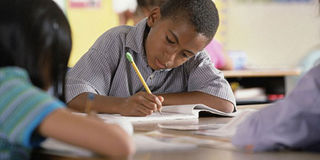Prime
Handling a child with a bad report card

Some children do not learn as fast as others and as such teachers need to accord all the necessary attention.
What you need to know:
We all think our children are special. But how does it feel when you realise your child’s grades are far from desirable?
When your child brings home a report card showing not so good grades, sometimes it is hard to decide on the next course of action. Do you act like it doesn’t matter, have a long discussion with your child about the importance of grades, or automatically punish them for having bad grades? While all of these may seem to be tempting options, it is important that you actually work with your child to help them start improving their grades. Bad grades can be a result of a variety of problems.
The slow learner
Jackie Nanteza* says her daughter is not a good performer in class but loves school.
“She is a teenager and should be in secondary school but she is still in primary school because she is a slow learner,” says Nanteza.
She adds that her daughter has a problem with teachers who punish her because of her poor performance and whenever she is punished she hates the school and asks to switch schools which delays her progress.
“I see her try so hard to study but still has poor grades and whenever she complains about being punished for poor performance by the teachers at school, I get time and go to school to explain her situation to the teachers and try to make them understand her situation,” she says.
She advises parents to always get time and talk to teachers, find out their child’s area of weakness and see how they can be helped to improve on their grades.
Nanteza says involving a child’s friends sometimes eases the learning process as they communicate at the same level. However, even when such an approach is taken she advises parents not to make their child appear vulnerable in front of their friends as this could lower their self-esteem.
At the moment, Nanteza is considering taking her daughter for a short course an idea that the girl opposes as she wants to go to university.
Teacher’s perspective
John Katongole, the head teacher at St Peter’s Senior Secondary School, Naalya says children need so much attention to know them better as well as create a personal relationship.
He says some parents and teachers expect all learners to understand at the same rate which is not possible.
He says before parents conclude that their child is dull, they should spend time with their children to encourage them in their field of weakness and not to blame them for the poor performance because he believes everything has a reason.
He further advises teachers to always re-stream children according to their performance so that so slow learners can be given adequate attention.
In case the poor performance is due to peer influence, children have to be counselled and if that fails then a punishment can be administered.
Katongole says such learners should be given regular assignments that will force them to jog their brain. As such, this work should be assessed by the teacher to gauge progress.
Counsellor’s take
Ali Male, a counselling psychologist at YWCA, defines dull children as those whose intelligence quotient (IO) is below the normal IQ. He says some of these behaviours are a result of risks during the prenatal development such as poor nutrition which affects brain development.
Although a lot of focus is dedicated to dull children, parents of such learners usually also suffer. Male advises such parents to seek professional help on how to best support their children.
Furthermore, he says parents should not neglect interacting with their children’s teachers because they can easily tell when something is wrong. He says usually such learners are more comfortable with neutral parties such as teachers or child therapists.
What you should do
Experts caution against comparing your child to a fast learner as this demoralises them.
Katongole advocates for critical observation on the part of parents to identify probable areas of improvement. For this to be a success, more time should be dedicated to parent-child interaction. It also calls for more encouragement in form of rewards, play therapy which will motivate the child to work so hard in class and with time the child will be able to improve over time.
What learners think
Esther a Senior Two student thinks parents should look at their children’s grades for what they are, a report based strictly on numbers, and not on the child’s desire to learn. She says if a child’s report card is bad, then rather than being punished, parents should merely see it as an alert to say, hire a tutor, or talk to the teachers.
Ben was moved from a boarding school to a day school early this year because his parents were separating. He got a bad grade in math and science, but the rest are good. His father decided that a proper punishment would be to ban him from watching TV for a month. He says this instead made him angrier and resent his father.
Isabella on the other hand cannot bring herself to handing her report card to her parents. “I am always afraid to give my parent my report cards, because they have such high expectations of me, and sometimes I can’t fulfill those expectations, so I think parents shouldn’t put pressure on their children.”
Way forward
Children who are obsessed with perfect grades may develop anxiety, neglect their friends and family, and develop unhealthy habits such as staying up all night. They may be tempted to cheat in order to maintain their perfect record. Or they may melt down at the sight of a bad mark. Avoid this scenario by setting realistic expectations for your child, praising him when he does well, and offering to help when he does not.
If you and your child are stressing out about grades, remember that they are just letters and numbers. The most important thing is that your child is learning. If she is progressing, that is good. If she is falling behind, assure her you will help her get back on track.
It is possible that when you dig deep into the reasons behind your child’s mediocre or poor report card, you may find out she simply did not apply herself and do the work. If that’s the case, withdrawing privileges and letting them know you are disappointed might be all that is necessary to turn things around.




